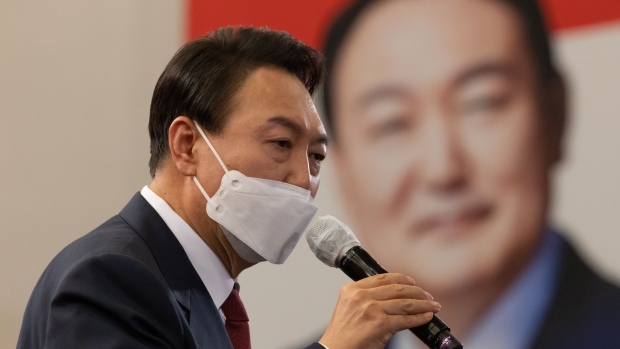Mar 10, 2022
South Korea’s New President Is Tough on China, Pro-Nuclear Power
, Bloomberg News

(Bloomberg) -- Conservative Yoon Suk-yeol’s narrow win in the South Korean presidential election could mean big policy shifts for Asia’s fourth-largest economy -- if the political newcomer can find some way around or through a hostile legislature.
The former top prosecutor quit President Moon Jae-in’s government in a dispute over corruption investigations last year and went on to defeat Moon’s Democratic Party successor, former Gyeonggi Governor Lee Jae-myung, in the race for president Wednesday. Yoon, 61, has called for greater private-sector-led growth and a tougher approach toward China and North Korea. The People Power Party candidate also faces opposition from many female voters, who felt alienated by his statements on the campaign trail.
Here are six things to know about Yoon:
1. China tensions loom
Yoon pledged Thursday to make South Korea a “pivotal country” in the global fight for “freedom, peace and prosperity,” suggesting he might be a more enthusiastic partner in U.S. President Joe Biden’s efforts to build a coalition of democracies. That could include greater participation in a U.S. push to develop supply chains less reliant on China, with South Korea’s massive semiconductor industry a key focus. Yoon has also called for an additional deployment of the U.S.-made missile interceptor system known as THAAD. China banned sales of group tour packages and appearances of Korean celebrities on television shows in retaliation for Seoul’s decision to deploy the missile shield system about six years ago.
2. Markets like him
South Korea’s main Kospi index jumped after Yoon won the race, encouraged by his business-friendly campaign pledges. His call to abolish a capital gains tax would end a Moon plan to introduce a tax of as much as 25% on investors next year. Market players said Yoon could lower the corporate tax rate, which would help a sluggish market. “I will create jobs and strengthen our middle class by shifting the focus of our economy toward the private sector rather than leaving it be led by the government,” Yoon said Thursday.
3. Gender disputes simmer
Yoon’s campaign courted young male voters opposed to gender-equality measures by arguing on the campaign trail that Moon was stacking the system against them. He also promised to close the Gender Equality Ministry, which could deal a blow to plans to narrow a gender wage gap that ranks as among the widest in the developed world and grew larger during the coronavirus pandemic.
4. Legislative gridlock awaits
The new president faces a National Assembly where Moon’s progressive Democratic Party holds a supermajority and has little appetite to help with Yoon’s domestic agenda. The next parliamentary election won’t come until 2024, so Yoon could face gridlock for at least the first two years of his term -- and perhaps even longer if the PPP can’t capture a majority. This means that Yoon might have to resort to executive orders to advance his agenda.
5. Easier for chaebols
South Korea’s sprawling “chaebol” conglomerates that account for large parts of the export-driven economy, such as Samsung, Hyundai and LG, will likely be spared any calls to add transparency to their corporate management. Yoon steered clear of calling for new restrictions on them during his campaign, while conservative governments have usually avoided imposing measures to curb their powers.
6. Nuclear power priority
The president-elect said he would invest and support nuclear power and wants to export the country’s technology overseas. Nuclear makes up about 29% of domestic power generation. Under the Moon administration, the installed capacity for nuclear was projected to fall to 19.4 gigawatts by 2034, from the current 23.3 gigawatts.
South Korea’s Pro-Nuclear President-Elect Boosts Atomic Stocks
©2022 Bloomberg L.P.








